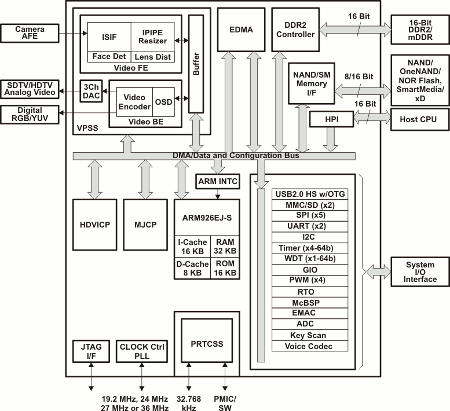TI SoC gets video communications dev kits
Apr 21, 2010 — by LinuxDevices Staff — from the LinuxDevices Archive — 15 viewsTI (Texas Instruments) announced two camera and communications development kits for its recently announced TMS320DM368 DaVinci video processor. The DM368EUCDK (embedded USB camera development kit) includes webcam hardware, while the DM368ECDK (embedded communications development kit) provides dual image sensors and communication boards, the company says.
TI's Linux-ready TMS320DM368 (DM368) video processor was launched earlier this month, providing a 432MHz ARM926EJ-S core along with DSP-driven HD video accelerators. The SoC is a faster, higher-resolution version of the chipmaker's previous TMS320DM365 SoC, and is said to provide 1080p video encoding at up to 30 frames per second.
According to TI, its new DM368EUCDK is designed for development of webcams, as might be added to kiosks, digital signage devices, and set-top boxes. The kit includes the DM368 processor, 128MB of DDR2 RAM, 16MB of NOR flash storage, plus either one-megapixel (the Omnivision OV9712) or five-megapixel (the Aptina MT9P031) image sensors, the company says.

TI's DM368EUCDK
The Leopard Imaging-developed kit also includes two microphones, a housing for the webcam hardware, plus a communication board (above) for debugging purposes. Peripherals integrated onto the communication board include JTAG, serial, Ethernet, audio, and video, TI says.

TI's DM368ECDK
The DM368ECDK, intended for development of video conferencing systems, omits the webcam housing but includes two DM368 main boards (again with 128MB of DDR2 RAM and 16MB of flash), two communication boards, and two image sensors (again, either the OV9712 or the MT9P031). This time around, the kit comes with four microphones and two 5VDC power adapters, according to the company.
TI says both the DM368EUCDK and DM368ECDK come with demo software, free Linux source code, and drivers that support either Linux or Windows CE. Providing 1080p streaming at 30 frames per second, the kits permit "easy and inexpensive integration into consumer systems," the company adds.
Background
 Announced earlier this month, TI's TMS320DM368 cranks up its ARM926EJ-S core to 432MHz, while offloading video encode/decode functions to DSP-driven HD video accelerators. The DM368 is a faster, higher-resolution version of the 300Mhz TMS320DM365 SoC (system-on-chip), and it's available with the DM365 IP camera design pictured at right.
Announced earlier this month, TI's TMS320DM368 cranks up its ARM926EJ-S core to 432MHz, while offloading video encode/decode functions to DSP-driven HD video accelerators. The DM368 is a faster, higher-resolution version of the 300Mhz TMS320DM365 SoC (system-on-chip), and it's available with the DM365 IP camera design pictured at right.
Pin-to-pin and software compatible with the DM365, the DM368 is designed for applications including HD video cameras, real-time digital video recorders (DVRs), HD video communications systems, and digital signage, says TI. The ARM core is 40 percent faster than that of the DM365, enabling advanced application programming interfaces (APIs) for HD video processing, as well as more "sophisticated user experiences," TI says.

DM368 block diagram
(Click to enlarge)
The processor also supports multi-format decode, multi-rate multi-stream, and HD multi-channel capabilities, says the company. Audio, speech and other HD video codecs are also said to be available.
For more information about the DM368, including details of the Appro IP camera reference design pictured above and a DVR reference design developed by UDWorks, see our earlier coverage, here.
Availability
According to TI, the DM368EUCDK and DM368ECDK may be ordered now for $795 and $1,195, respectively. More information on the devices may be found on the TI website, here.
More information on the DM368 itself, which is said to be sampling now, may be found on TI's website, here.
This article was originally published on LinuxDevices.com and has been donated to the open source community by QuinStreet Inc. Please visit LinuxToday.com for up-to-date news and articles about Linux and open source.